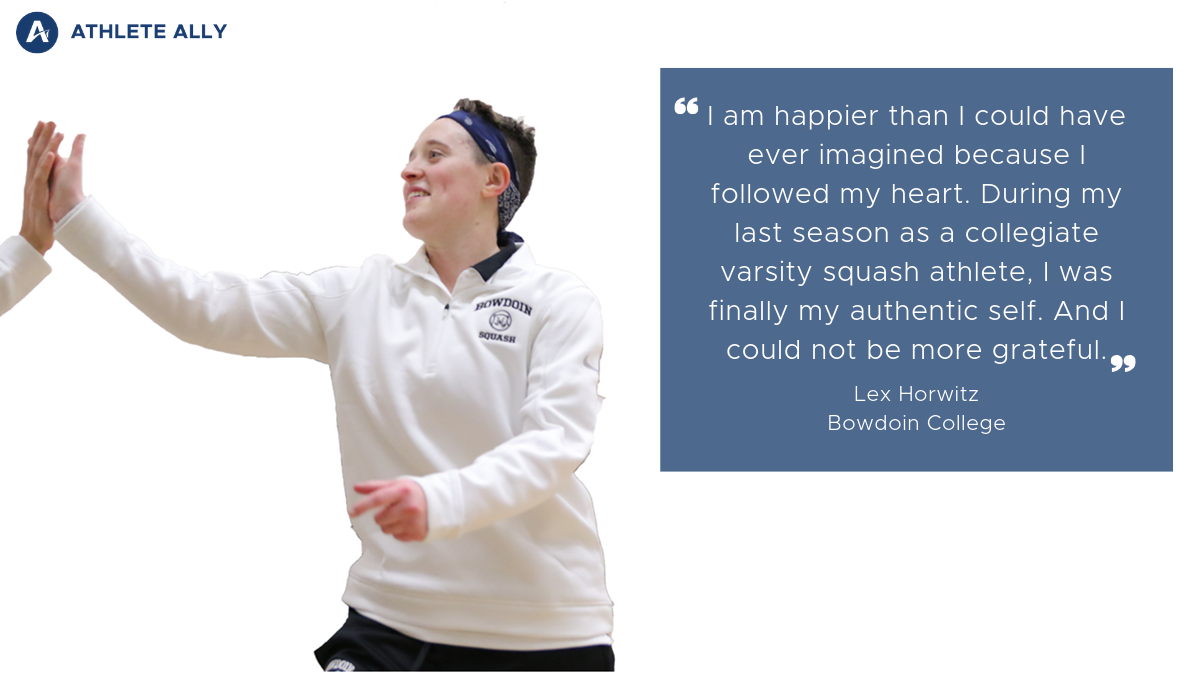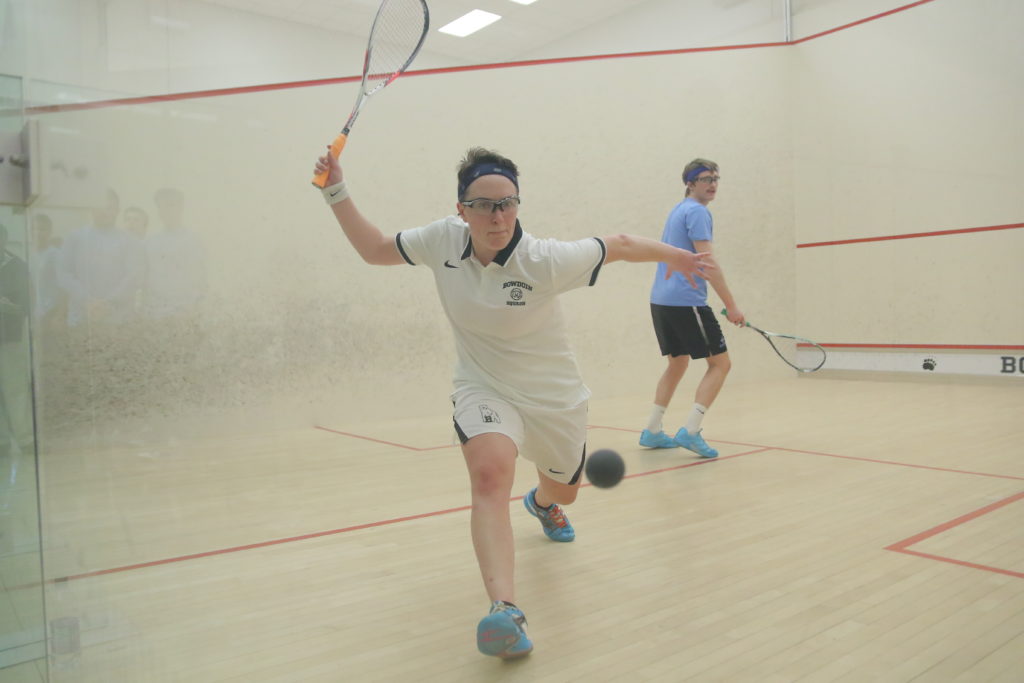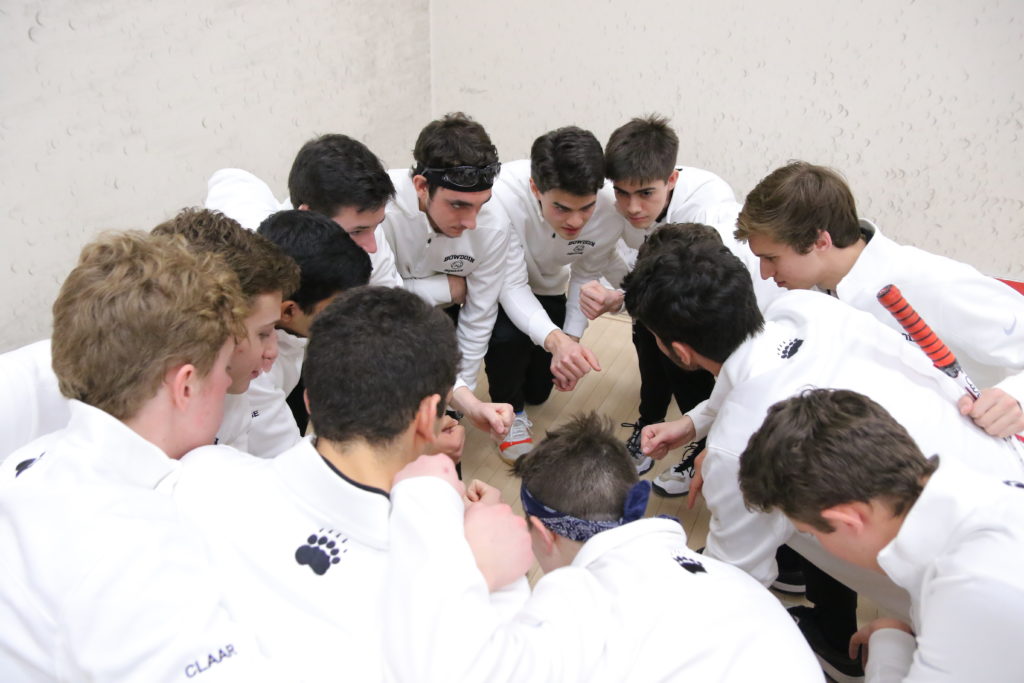Squash Player Lex Horwitz: I Followed My Heart, and I Couldn’t Be Happier

By: Lex Horwitz, Bowdoin College Varsity Men’s Squash Team
My name is Lex Horwitz, and I play on the Varsity Men’s Squash Team at Bowdoin College. I’m sharing my coming out story so that you can join me in supporting other non-binary athletes who want to play the sports we love without having to hide who we are.
I knew from a young age that being an athlete was a central part of my identity. Growing up, I thought I was a cisgender straight girl because I didn’t know that it was ok or safe to be anything else.
When I started college at Bowdoin, I joined the Women’s Squash Team, and initially, I fit right in. Then, I fell in love with a girl on my team and was in my first queer relationship. We weren’t sure how the team would react, so we kept our relationship a secret until the last tournament of the season. When we told our teammates, at first they thought were joking, but when they realized we weren’t they all hugged us, cheered (some even cried tears of joy), and told us how happy they were for us. The reaction from the Men’s Team, however, was a whole different story. Many of them laughed right in our faces, and told us they didn’t believe us and to stop lying.
The next year, I took my first Gender, Sexuality, and Women’s Studies course, which set off a lightbulb—just because I was assigned female at birth didn’t mean that I had to be a woman. I felt like I finally understood myself—I had always been a masculine person and identified as a tomboy, but as a kid I didn’t understand what that meant, until now, when I started to question my identity.
I had to figure out what to do with this new realization regarding gender while additionally being well aware that I no longer fit in with my team because of my sexuality. I was the only out queer person, and felt like no one understood me. The team was driven by heteronormativity both on and off court—at a party I was once handcuffed with zip ties to a guy on the men’s team who liked me (without my permission), something that made me feel invalidated, invisible, and inhuman as a queer person.

Bowdoin College Athletics, Bowdoin College, Brunswick, Maine, Brian Beard – CIP
I started to consciously explore my gender expression (i.e., how I dressed, did my hair, expressed myself masculinely, femininely, and/or androgynously), but that wasn’t enough for me to feel fully myself, so I looked into exploring my gender identity (i.e., identifying as a man, woman, both or neither). The week before coming back to campus for my junior year, I came out as genderqueer and started using they/them pronouns (I now identify as non-binary transmasculine and still use they/them pronouns). The first day back I met with my co-captains and teammates on the Women’s team and told them that my name was Lex and to use they/them pronouns.
Throughout my junior season, I was unhappy, anxious, and depressed due to constant misgendering, gendered language at practices and matches, the lack of respect from some of my teammates and my coach, and my discomfort in using the locker room—all of which started to feel like the norm for a queer athlete. It wasn’t until the end of my junior season that I started to contemplate the idea of joining the Men’s team with the hopes of finding happiness again in the sport that I used to love and cherish. However, I was warned by a friend on the Men’s team that if I did, I would likely feel uncomfortable and maybe even harassed by a few senior members until I “chose” to quit. It felt like a lose-lose situation.
My senior year I’d come back from practice, cry, and tell my best friend that I felt like my insides were decaying. I realized that I was quickly losing my love of the sport and hurting myself by staying on the team. I decided to act. I looked up the NCAA rules on athletes assigned female at birth playing on a men’s sports team and found that I was eligible. I wrote a letter to the head of athletics outlining the regulations, my eligibility, and my desire to join the Men’s team. Before going into my meeting with the athletic director I knew there were only two potential endings to this story: 1. I play on the Men’s team, or 2. Transphobia wins and I have to stop playing the sport that I love. There was no “option 3” because I respected my mental health and happiness enough to know that playing on the Women’s team was no longer an option.

Bowdoin College Athletics, Bowdoin College, Brunswick, Maine, Brian Beard – CIP
Lucky for me, the athletic director gave me option 1. We had meetings to figure out what I needed to be physically and mentally comfortable on the Men’s team, to plan how I would tell the coaches and individual teams, and to write letters to the teams that were visiting our school and the schools that we would be visiting so that they were aware of the need for inclusive facilities. The process started by telling the coaches, then the captains of both teams, then the Women’s Team and then, lastly, my new team–the Men’s Team. After the meeting, my new teammates came up to me, patted me on the back and welcomed me with open arms. They made no fuss, they were not upset, they didn’t ask inappropriate questions. Yes, the team would be different given that I was the first out transgender athlete at Bowdoin (and in all of collegiate squash). Yes, we would have to navigate personal comfort in the locker room. But these were not reasons for me to be barred from competition — these were reasons for us to grow as individuals and teammates.
And now, I can confidently say that I have never been happier playing on a team—I love my sport and my team. I never thought that I’d be able to say that, given my history of constant discomfort and experiences of invalidation and disrespect while playing on the Women’s squash team.
In retrospect, I realized that walking into the “Women’s” locker room and being called a “lady” or “girl” at least three times a practice was breaking me. Being on a team of women when I am not a woman caused me significant psychological distress because people (incorrectly) assumed my gender based on my teammates.
Now, I walk into the “Men’s” locker room and feel validated by the stick figure person who looks more like me than the stick figure wearing a dress on the “Women’s” locker room sign. I’m one of the bois and surrounded by individuals more similar to myself, and I’m hopeful that there are fewer people making wrongful assumptions about my gender. Now, at matches during the lineup, I am announced as a member of the MEN’S team. Finally, I feel revitalized and empowered in the sport I cherish.
I am happier than I could have ever imagined because I followed my heart. During my last season as a collegiate varsity squash athlete, I was finally my authentic self. And I could not be more grateful.
Follow Lex’s journey through their Instagram,YouTube, Facebook and website.